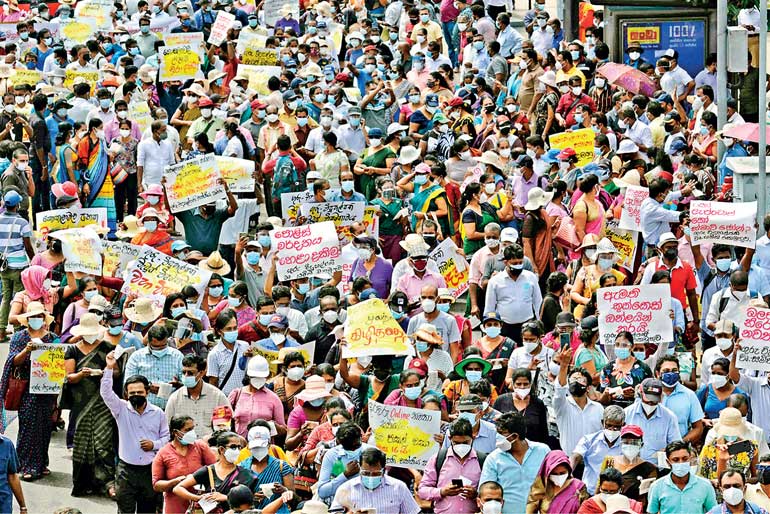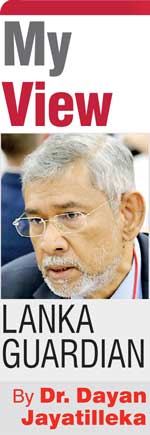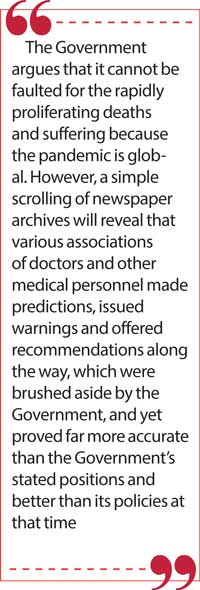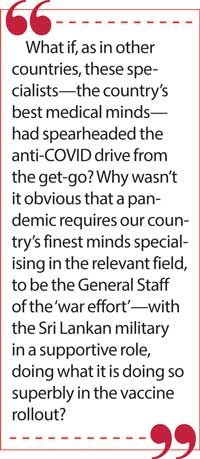Monday Feb 16, 2026
Monday Feb 16, 2026
Thursday, 12 August 2021 00:00 - - {{hitsCtrl.values.hits}}

If as the Government alleges, the quantum jump in the spread of COVID was due to the demonstrations/demonstrators, those demonstrations were the direct product of Governmental decisions – introduction of the controversial KNDU draft legislation, the arrest and forcible quarantining of Joseph Stalin and a number of trade union leaders, the refusal to indicate the rough quantum of a pay-hike and pledge its implementation through the Budget, and the fertiliser-weedicide-pesticide bans which brought on the first wave of demonstrations – Pic by Shehan Gunasekara
 A violent demonstration is one in which the protestors throw Molotov cocktails or at least rocks, smash shop-windows, etc. There have been no violent demonstrations so far. There has been one in which there was a forceful scuffle over barricades, causing injury, which going by the repeated slo-mo replay of the moment by TV newscasts that evening, seems inadvertent.
A violent demonstration is one in which the protestors throw Molotov cocktails or at least rocks, smash shop-windows, etc. There have been no violent demonstrations so far. There has been one in which there was a forceful scuffle over barricades, causing injury, which going by the repeated slo-mo replay of the moment by TV newscasts that evening, seems inadvertent.
Why then are there arrests of those who participated on the occasion as well as of those who were at other protests without incident? Why does the grapevine say that well-known senior academics are slated for arrest?
Crackdown and Geneva session
When the Police arrested 44 demonstrators, 16 of whom were women, on their way back home from a protest, why were they detained at the Harbour Police? It is far more inaccessible than any other Police station, as the Leader of the Opposition found out when he attempted to visit those detained. Therefore, it is obvious that inaccessibility was a motivation in the choice of place of detention.
Since the women demonstrators were middle-aged schoolteachers, wearing traditional Kandyan saree (or ‘osari’ as it is called) as schoolteachers tend to, and hardly fit the profile of denim-clad radical leftist campus activists, one can glimpse the brutish mentality of whoever took the decision to detain them overnight at the Harbour Police while their families were sick with worry as to their whereabouts and wellbeing.
The convenor of the Inter-University Students Federation, Wasantha Mudalige, was seized by the Police off a three-wheeler, on a dim, deserted, suburban road, while returning after a late-night Sirasa debate on the KNDU bill.
The arrests signal a new trend and dynamic. If so, the social movements of democratic resistance have no choice. If the Dark State (as I call the Deep State risen) is taking it to the next level, then the democratic resistance which includes the democratic parliamentary Opposition may have to do so too, peacefully.
The September session of the UN Human Rights Council in Geneva is only a few weeks away. The GR regime is on its radar. When regimes cross the line of democratic governance, social movements appeal for international solidarity from international labour federations, student federations, legislators and international human rights platforms including the UNHRC—as Mahinda Rajapaksa did in the late 1980s as an Opposition MP.
COVID catastrophe
The commendably brisk vaccine rollout has proved unable to keep pace with, still less get ahead of the exponential expansion of the epidemic due to a conspicuous lack of what the Buddha called ‘right mindfulness’.
When the Leader of the Opposition was warning in Parliament in January and February 2020 about the coming COVID wave and the need to gear up for it, the President was scoffing (as captured on TV news) while chairing a conference that “this is a small matter…during the war, thousands died in a day”. 
Now, Dr. Ravi Rannan-Eliya, who has been the most consistently accurate in his newspaper articles and interviews about the COVID-19 calamity as it affects Sri Lanka, projects a horrendous 20,000 deaths by the end of this year. (Sri Lanka’s COVID-19 third wave on track to taking 20,000+ lives by December: expert | EconomyNext – https://economynext.com/sri-lankas-covid-19-third-wave-on-track-to-taking-20000-lives-by-december-expert-84706/)
He points out that shockingly: “Most likely over 3,000 people are dying of COVID-19 now each month. This is worse than the death toll during the ’87–’89 JVP (Janatha Vimukthi Peramuna) insurgency” (ibid).
President GR told SAARC leaders during a virtual conference in 2020 that only a few had died of Covid and that he was forging ahead with a general election. The Opposition had petitioned the courts while urging the President to hold elections on schedule any time after August 2020 while coming together in the meanwhile to smash the first wave of COVID. The President brushed aside the offer and went ahead with snap-electioneering. (In this column I endorsed even an early election because there were many in the GR camp calling publicly for scrapping elections, shutting-down Parliament, and ruling with/through the military).
When the Opposition Leader called for the import of stocks of vaccines at the beginning of the pandemic, the junior champ aspiring to the top spot retorted vehemently that we would not procure any vaccine unless it was first approved by the WHO. This was at a time when many countries were stockpiling without awaiting the WHO verdict. Their decision was based on what their national medical authorities said. Sri Lanka could have gone ahead, based on reports from our top experts including expatriate ones. Now we are playing catch-up.
I knew we were in trouble when the Chinese Embassy in Sri Lanka tweeted a rousing cheer on the speed of the vaccination campaign based on data from the Johns Hopkins tracker. Though an accurate compliment, it was like gifting a bottle of Chateauneuf-du-Pape to an alcoholic. The Government quickly went on a propaganda binge about being “the world’s best” (yet again), and gave instructions that public servants should return to work. On an earlier occasion, when a Shanghai-based institute ranked Sri Lanka as the world’s best performer in combatting COVID, apart from China of course (it was the only international organisation to do so) the Government opened up for the Sinhala-Tamil New Year, and for tourists.
This time around, when the COVID figures skyrocketed, making Sri Lanka the country with the highest number of daily deaths per million according to the Johns Hopkins tracker (6 August), the Government blamed the demonstrations. That’s illogical.
Firstly, the commuting public servants number vastly more than the demonstrators.
Secondly, the jam-packed trains, with travellers hanging out of doors in clusters, revealed the more likely super-spreader.
Thirdly, none of the arrested demonstrators tested positive for COVID-19, and they constitute a random sample. The teacher from Badulla who was supposed to have organised that segment of the protest according to the Government, was (demonstrably) self-quarantining at home during the demonstration.
If as the Government alleges, the quantum jump in the spread of COVID was due to the demonstrations/demonstrators, those demonstrations were the direct product of Governmental decisions:
(a) The introduction of the controversial KNDU draft legislation which brought the students out onto the streets together with some trade unions.
(b) The arrest and forcible quarantining of Joseph Stalin and a number of trade union leaders, thereby triggering a massive teacher-school principals’ protest movement on outstanding issues.
massive teacher-school principals’ protest movement on outstanding issues.
(c) The refusal to indicate the rough quantum of a pay-hike and pledge its implementation through the Budget.
(d) The fertiliser-weedicide-pesticide bans which brought on the first wave of demonstrations—by the peasantry.
Why announce a fertiliser ban while a pandemic is rolling? Why follow it up by placing the KNDU bill on the agenda? Why arrest the Leader of the Ceylon Teachers’ Union who seems to have rebuilt the union back to or even beyond its strength during the glory days under the late H.N. Fernando (Wijeweera’s estranged brother-in-law)?
Fatally flawed
The fundamental reason that we now have the fastest death-rate is that this administration got the fundamentals wrong. As the President should know, you can’t get your strategy and your force configuration/deployment wrong, but your tactics right, and expect to win a war.
The pivotal moment in the decision by the protestors to call off the waves of demonstrations rolling into Colombo from the provinces, was not the arrest of demonstrators or the call by the authorities. It was the red alert regarding a COVID explosion in the Open Letter by the Association of Medical Specialists. Why? Because its educational and professional credentials, and the accuracy of its earlier predictions, gave it unquestioned social authority and national credibility.
Revealingly, the demonstrators reacted faster and more positively to the Association of Medical Specialists’ plea than has the Government, which has so far, not recalibrated its tourism policy as urged by the top doctors.
What if, as in other countries, these specialists—the country’s best medical minds—had spearheaded the anti-COVID drive from the get-go? Why wasn’t it obvious that a pandemic requires our country’s finest minds specialising in the relevant field, to be the General Staff of the ‘war effort’—with the Sri Lankan military in a supportive role, doing what it is doing so superbly in the vaccine rollout?
By what conceivable logic was the anti-COVID campaign spearheaded by the Army Commander? Where else in the world does that happen? Not in China. Perhaps in Myanmar?
The fault for the suffering of the Sri Lankan citizenry is by no means that of the Army Commander, but of those who decided to deploy him front and centre in a battle he was neither trained nor experienced to fight in and cannot win.
The rejoinder that Minister Basil Rajapaksa is the chief crisis-manager and trouble-shooter, doesn’t reassure. The key question is about the formulator of policy in combatting a pandemic, on whose advice the President should make decisions. That policy-formulator and public communicator in the case of a pandemic has to be a top medical professional in the relevant field.
Dr. Anthony Fauci, a scientist and immunologist, is head of the US Center for Disease Control. He is the American President’s Chief Medical Advisor on COVID-19. Who and where is Sri Lanka’s Dr. Fauci? Surely it cannot be the Army Chief or a heart surgeon.
The Government argues that it cannot be faulted for the rapidly proliferating deaths and suffering because the pandemic is global. However, a simple scrolling of newspaper archives will reveal that various associations of doctors and other medical personnel made predictions, issued warnings and offered recommendations along the way, which were brushed aside by the Government, and yet proved far more accurate than the Government’s stated positions and better than its policies at that time.
The Gotabaya administration failed to observe the basic operational principal of assembling and adhering to the views of the most credentialed and experienced—the best minds—in the relevant field. It thinks its panoptic capacity for surveillance made it omniscient in all fields from agriculture (pun intended) to epidemiology.
capacity for surveillance made it omniscient in all fields from agriculture (pun intended) to epidemiology.
The Government’s excuse, that the pandemic is planetary, ignores the conspicuous and sustainable success of New Zealand. NZ has a better track record than even China, the Gotabaya administration’s Shangri-La. Sri Lanka could have studied, sought advice and assistance from and emulated with due adaptation, the NZ success story, which for the most part preceded, though reinforced later by, the vaccine rollout. Our Government chose not to reach out.
The Government’s related contention, about the universality of the economic crisis, is a half-truth. There is a global economic crisis but not all countries are equally affected. The US economy was crashing under Trump but is growing rapidly, through Biden’s ambitious neo-Rooseveltian, neo-Keynesian package(s).
Closer home we have the examples of Vietnam and Bangladesh, neither of which owe anything to a primitive policy of bans on imports, still less of import-bans on synthetic fertiliser, weedicides and pesticides.
The latter policy of the Gotabaya administration will enhance the suffering of the Sri Lankan people due to COVID-19 and irrational regime-responses, by adding collapsing harvests and rural incomes, compounded by urban food shortages, to the mix of mass miseries.
KNDU debate: Dropped catch
At the debate on the KNDU bill on Sirasa’s Mawatha program of a week ago, the principal defence of the bill was undertaken by Dr. Mahinda Pathirana, a well-known Pohottuwa academic (close to Basil Rajapaksa) and the Chairman of the Press Council. He was supported by another academic from the Sabaragamuwa University, whose name (but not frame) escapes me. The critics (apart from impassioned, intelligent, student leader Wasantha Mudalige) were Dr. Liyanage Amarakeerthi (Peradeniya), Dr. Dinesha Samararatne (Colombo) and Prof. Harshana Rambukwelle (OUSL).
The trio of critics of the KNDU, first-rate academics displaying far superior intellectual, analytic, argumentative and expressive capability, almost—but not quite—wiped the floor with the KNDU bill’s defending duo. Things might have been less uneven had the KNDU project’s Dr. Harinda Vidanage participated, but he and Dr. Athulasiri Samarakoon (contemporaries, and my former students, at Colombo University) had debated this topic on an earlier show.
The left-liberal troika’s win was not a knock-out. In the face of the pro-KNDU Sabaragamuwa University academic’s frontal attack on violent ragging practices, only Dr. Dinesha Samararatna (no fellow-traveller of any political formation) took a clear and correct stand, saying it was a serious problem which should be condemned and rooted out, but the KNDU bill was by no means the answer.
Mahinda Pathirana repeatedly and explicitly invoked the doctrine of “Military-Civil Fusion”. (He continues on his FB, trashing his academic foes from ‘debate night’.) Though the left-liberal trio correctly scoffed when he tried to pass off this formula as an example of the interdisciplinary approach, and also pointed out that West Point students and alumni have far greater freedom of expression than the KNDU ones, they missed the chance to blow Pathirana’s conceptual gun-boat clean out of the water.
The left-liberal senior academics appeared to have no notion of the formula Military-Civil Fusion (MCF) and where it came from. It is a key doctrinal concept of the Chinese leadership under President Xi, and has been widely and critically examined by Western think-tanks and policy intellectuals. Its intellectual importation to Sri Lanka i.e., from a one-party (Hannah Arendt would say ‘totalitarian’) system to a multiparty pluralist democracy, involves a particularly pernicious permeation. It is publicly used by the MoD to justify the KDNU.
Pathirana was using this MoD ideological software imported from China. Though he claims Military-Civil Fusion is ‘inter-paradigmatic’ (or ‘inter-paradigmic’ as he calls it), it is, with regard to Sri Lanka, an application of discredited old ‘convergence theory’. It is deployed as a justification of a systemic transition from the norms and ethos of civilian democracy and a free and open society.
I had put the spotlight on this, weeks back on 22 July in this column, the relevant subheading of which read ‘It’s the MCF, Stupid’. (Kill Bill: President Gotabaya’s second term and the KDU bill | Daily FT – https://www.ft.lk/dayan_jayatilleka/Kill-Bill-President-Gotabaya-s-second-term-and-the-KDU-bill/10527-720736) As Marx expostulated: “ignorance never helped anyone yet!”
Geneva vaccine
As the Government confronts the prospect of a (well-deserved) thrashing at the UNHRC this September, and the Secretary MoD massacres innocent facts of diplomatic history, comes a single-jab vaccine against inexperience and ignorance. Hot off the press is a slim volume (192 pages) entitled ‘Representing Sri Lanka: Geneva, Rights and Sovereignty,’ which provides a detailed, authentic narrative by Prof. Rajiva Wijesinha, a key participant of Sri Lanka’s Human Rights diplomacy 2007-2012, reconstructing the inside story of its rise and fall—a continuing crisis and collapse.
It is difficult however, to expect any kind of qualitative improvement in our diplomacy, especially with the newly-envisaged or entered upon privatisation of our foreign representation. Recruiting personnel from designated private companies to certain posts and regions (Sunday Times) poses a clear and present danger of a conflict of interests, with the recruits serving the narrow business interests of their long-term employers rather than the broader national interest.